强调句和定语从句
图片预览
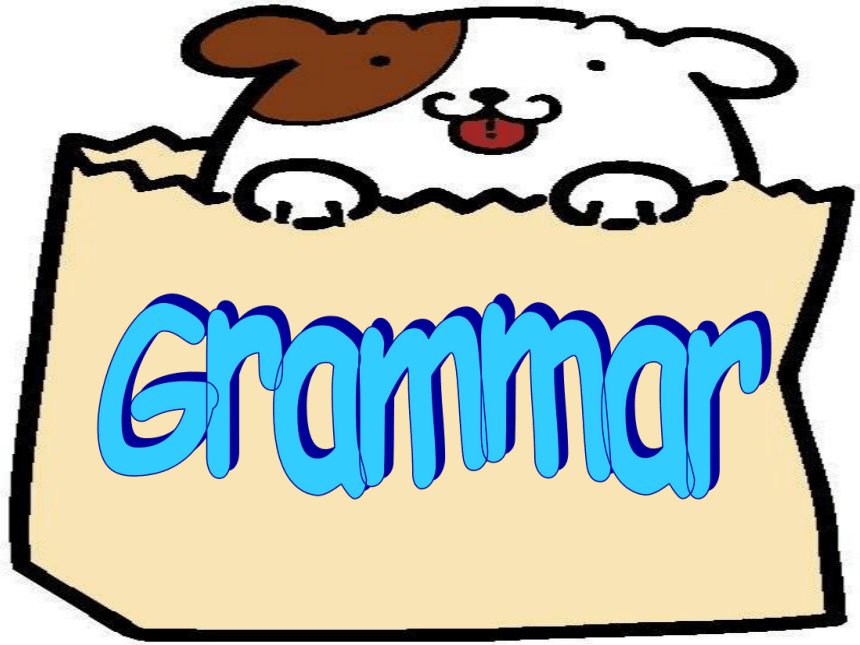
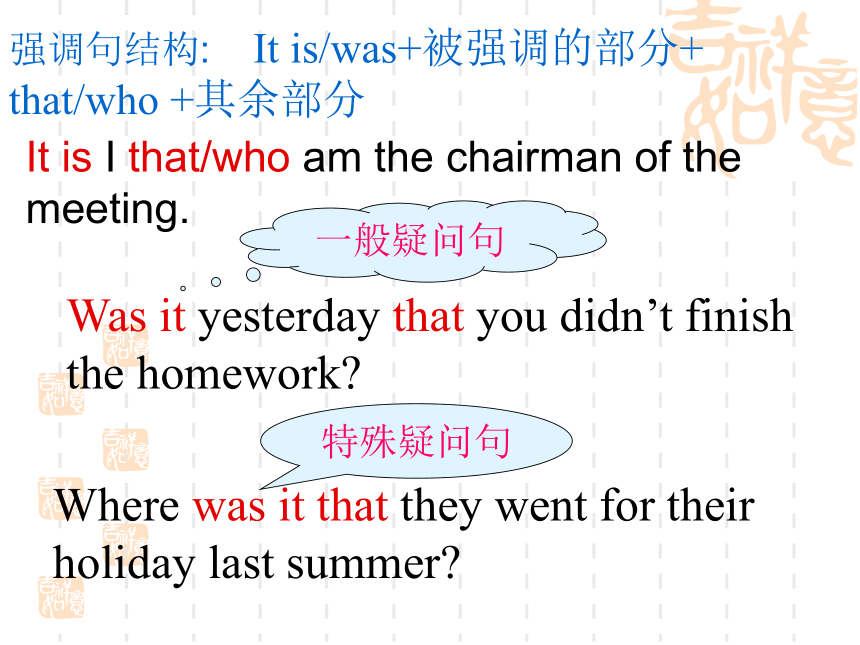
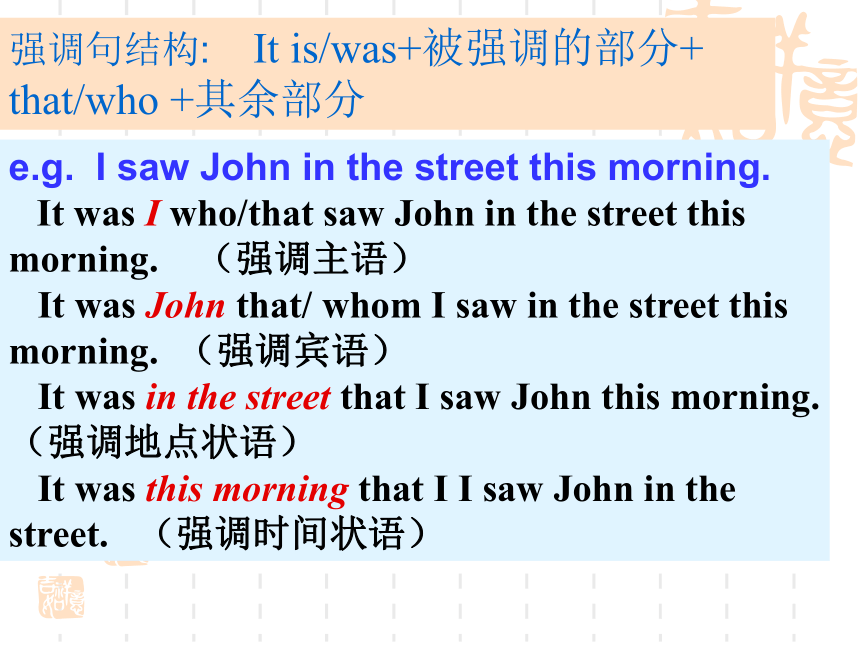
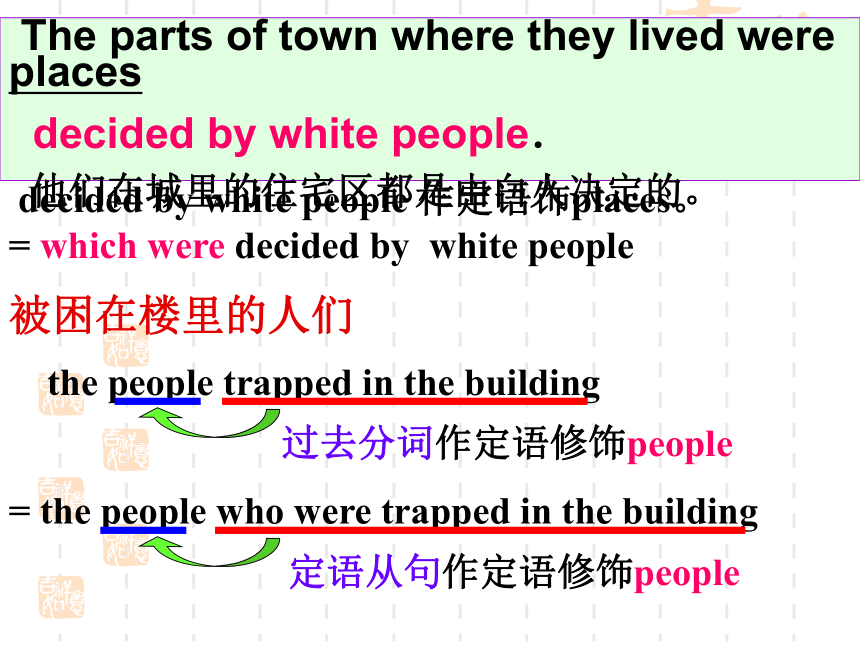

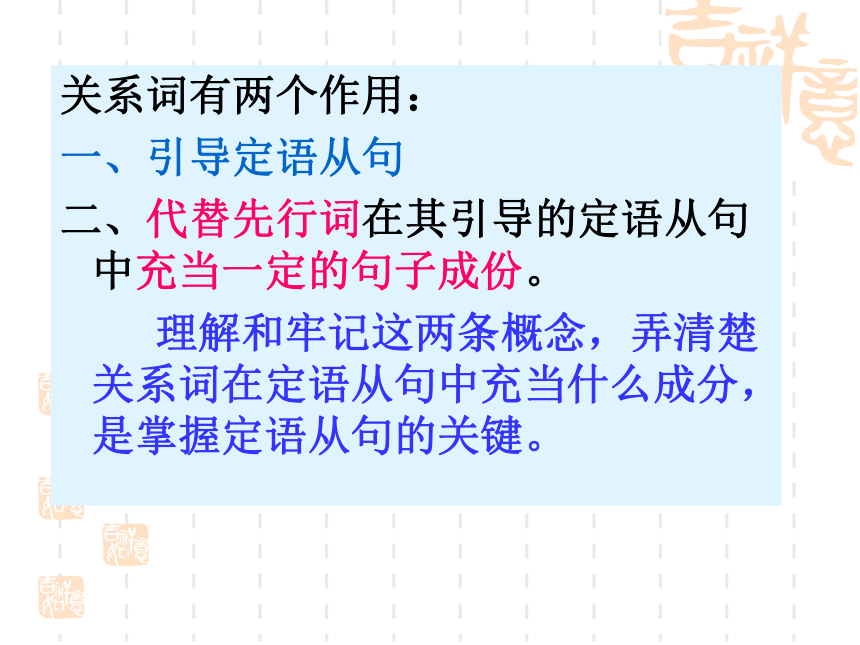
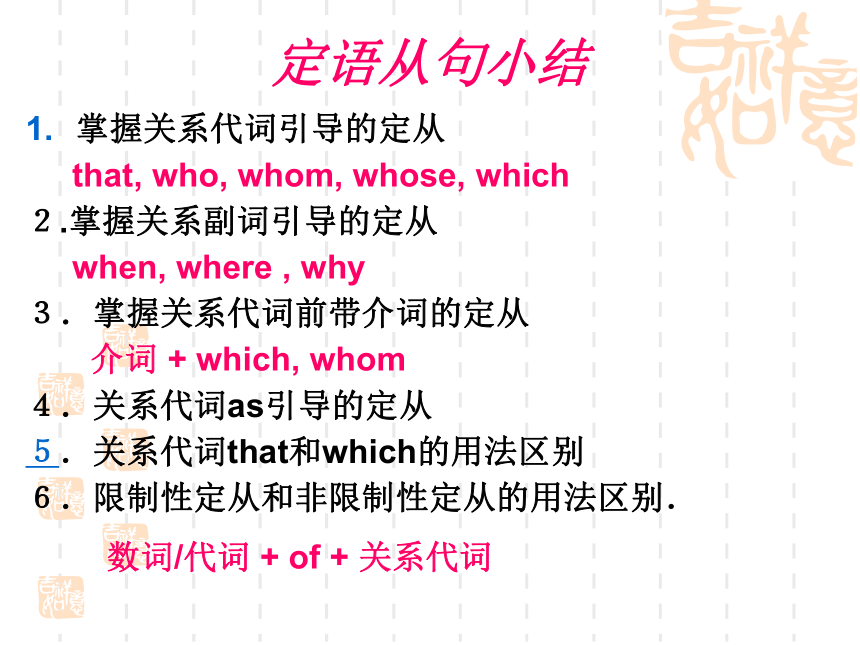
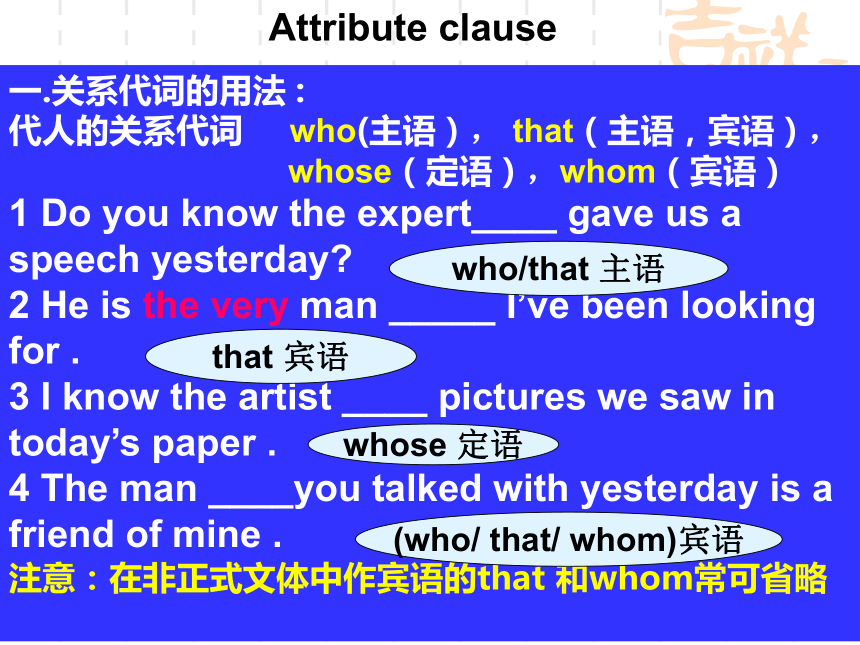
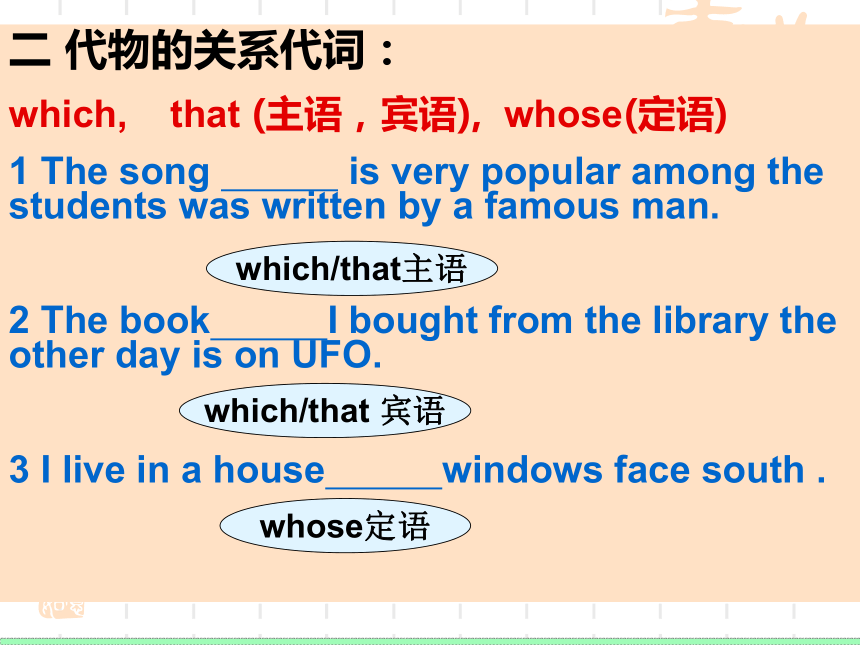
文档简介
课件29张PPT。Grammar强调句结构: It is/was+被强调的部分+ that/who +其余部分It is I that/who am the chairman of the meeting.Was it yesterday that you didn’t finish the homework?Where was it that they went for their holiday last summer?一般疑问句特殊疑问句强调句结构: It is/was+被强调的部分+ that/who +其余部分e.g. I saw John in the street this morning.
It was I who/that saw John in the street this morning. (强调主语)
It was John that/ whom I saw in the street this morning. (强调宾语)
It was in the street that I saw John this morning. (强调地点状语)
It was this morning that I I saw John in the street. (强调时间状语) The parts of town where they lived were places
decided by white people.
他们在城里的住宅区都是由白人决定的。 decided by white people 作定语饰places。
= which were decided by white people
被困在楼里的人们
the people trapped in the building
= the people who were trapped in the building过去分词作定语修饰people定语从句作定语修饰people
定语从句关系词有两个作用:
一、引导定语从句
二、代替先行词在其引导的定语从句中充当一定的句子成份。
理解和牢记这两条概念,弄清楚关系词在定语从句中充当什么成分,是掌握定语从句的关键。定语从句小结掌握关系代词引导的定从
that, who, whom, whose, which
2.掌握关系副词引导的定从
when, where , why
3.掌握关系代词前带介词的定从
介词 + which, whom
4.关系代词as引导的定从
5.关系代词that和which的用法区别
6.限制性定从和非限制性定从的用法区别.
数词/代词 + of + 关系代词Attribute clause一.关系代词的用法 :
代人的关系代词 who(主语), that(主语,宾语),
whose(定语),whom(宾语)
1 Do you know the expert____ gave us a speech yesterday?
2 He is the very man _____ I’ve been looking for .
3 I know the artist ____ pictures we saw in today’s paper .
4 The man ____you talked with yesterday is a friend of mine .
注意:在非正式文体中作宾语的that 和whom常可省略
who/that 主语that 宾语whose 定语(who/ that/ whom)宾语二 代物的关系代词:
which, that (主语,宾语), whose(定语)
1 The song is very popular among the students was written by a famous man.
2 The book I bought from the library the other day is on UFO.
3 I live in a house windows face south .
which/that主语which/that 宾语whose定语在that和 which 同指事物时, 以下情况下用that ,而不用which:1当先行词是all, everything , nothing , something , anything , much, little , few 等不定代词时
eg. That is all that I want to say .
There is nothing that can stop him from doing it.
2.先行词被序数词修饰时;
eg. The first place that they visited in China is the Great Wall.3.先行词被形容词最高级修饰时;
This is the most interesting film that I’ve seen.
4.先行词被the very, the only , the just等修饰时
Mr. Smith is the only foreigner that he knows .
This is the very dictionary that I want to buy .在that和 which 同指事物时, 以下情况下用that ,而不用which:as与which引导的定语从句 两者均可引导非限制性定语从句,有时可以互换,但下列情况多用as。
1. 关系代词引导的定语从句居句首时。
e.g. As we all know, the earth is round.
2. 当与such或the same连用时,一般用as。
e.g. Such books as you tell me are interesting.
I have the same plan as you.
He is not the same man as he was .4. as在从句中作主语时,后面常接行为动词的被动语态,如be known,be said,be reported等,如从句中行为动词是主动语态,一般要用which作主语。
e.g. She has been late again, as was expected.
Tom has made great progress, which made us happy.when (代时间)= on / in which
where (代地点)= in / on which
why (代原因)= for which关系副词的用法:关系副词引导的定语从句 关系副词可代替的先行词是时间、地点或理由的名词,在从句中作状语。
例:I’ll never forget the time when we worked on the farm.
The factory where his father works is in the west of the city.
This is the reason why he came late.
我祖父从前住的屋子离这儿不远。
The room is not far from here.
My grandfather once lived there.先行词关系副词定语从句
The room where my grandfather once lived
is not far from here.
The time when I first met Nelson Mandela was a
very difficult period of my life.第一次见到纳尔逊· 曼德拉的时候是在
我一生中非常艰难的时期。先行词定语从句关系副词
时间状语 The school where I studied only two years
was three kilometers away.我仅仅在那里读了两年的学校有
三公里远。先行词定语从句关系副词
地点状语 We were put in a position in which we had
either to accept we were less important,or
fight the Government.我们被置于这样一个境地:要么我们被迫接受低人一等的现实,要么我们跟政府作斗争。先行词定语从句介词+关系代词
关系副词when, where, why的含义相当于"介词+ which"结构,因此常常和"介词+ which"结构交替使用,例如: 1.Beijing is the place where (=in which) I was born.
2.He will never forget the day when (=on which) his father was beaten to death.
3.This is the reason why (=for which) he was late for class?
1.This is the museum_______you saw the
other day.
2.This is the museum________we saw an
exhibition (展览) the other day.
A.that B.which C.where D.in whichthat/whichwhere/in which1.You saw the museum the other day.
2.We saw an exhibition in the museum
the other day.宾语
3.He has left for Beijing,__________a meeting
will be held.
4.He has left for Beijing,_________is the
capital of China.
A.in which B.where C.that D.whichwhere=
in whichwhich
3. a meeting will be held in Beijing.
4. Beijing is the capital of China.
The factory___ I am going to visit is the place____my mother used to work many years ago.
A.where, where
B.where, which
C.which/where
D.that/whichThe factory 充当visit的宾语work in this place the place在从句中充当地点壮语The town____we are moving is the one_____ I used to live in.
A.towards, which
B.where, which
C.where, where
D.at which, wheremove to the town我永远也忘不了第一次参观那美丽小岛的日子。
I shall never forget the day when we first visited the beautiful island.
正当我们急需帮助的时候,他来了。
He came at a time when we were badly in need of help.非限制性定语从句
非限制性定语从句只是作一些补充说明的作用,往往用逗号分开;有时先行词是整个句子,非限制性定语从句用which 引导, where也可以
We walked down the village street , where there are many children.
He passed the exam, which made his parents very happy.
使用定语从句应注意的问题
1.从句中的谓语动词用单数还是复数由先行词决定
The students who are in Grade Three will climb the mountain.
2.定语从句有时不直接紧靠先行词,中间有时有一个定语、状语或谓语隔开
There is an expression in his eyes that I can’t know.
非限制性定与从句中,要表示先行词的一部分时,可用“数词/代词 + of + 关系代词”的结构,如:
e.g. There are 50 students in our class, two- thirds of whom have been to Beijing.介词+关系代词**** “介词 + which/whom”可用来限定名词、代词、分数词、数词等。
e.g. 1. In the dark street, there wasn’t a single person _____she could turn for help.
A. that B. who C. from whom D. to whom
turn to sb.for help 向某人寻求帮助
2. He paid the boy $10 for washing the windows, most of ______hadn’t been cleaned for at least a year.
A. these B. those C. that D. which DD
It was I who/that saw John in the street this morning. (强调主语)
It was John that/ whom I saw in the street this morning. (强调宾语)
It was in the street that I saw John this morning. (强调地点状语)
It was this morning that I I saw John in the street. (强调时间状语) The parts of town where they lived were places
decided by white people.
他们在城里的住宅区都是由白人决定的。 decided by white people 作定语饰places。
= which were decided by white people
被困在楼里的人们
the people trapped in the building
= the people who were trapped in the building过去分词作定语修饰people定语从句作定语修饰people
定语从句关系词有两个作用:
一、引导定语从句
二、代替先行词在其引导的定语从句中充当一定的句子成份。
理解和牢记这两条概念,弄清楚关系词在定语从句中充当什么成分,是掌握定语从句的关键。定语从句小结掌握关系代词引导的定从
that, who, whom, whose, which
2.掌握关系副词引导的定从
when, where , why
3.掌握关系代词前带介词的定从
介词 + which, whom
4.关系代词as引导的定从
5.关系代词that和which的用法区别
6.限制性定从和非限制性定从的用法区别.
数词/代词 + of + 关系代词Attribute clause一.关系代词的用法 :
代人的关系代词 who(主语), that(主语,宾语),
whose(定语),whom(宾语)
1 Do you know the expert____ gave us a speech yesterday?
2 He is the very man _____ I’ve been looking for .
3 I know the artist ____ pictures we saw in today’s paper .
4 The man ____you talked with yesterday is a friend of mine .
注意:在非正式文体中作宾语的that 和whom常可省略
who/that 主语that 宾语whose 定语(who/ that/ whom)宾语二 代物的关系代词:
which, that (主语,宾语), whose(定语)
1 The song is very popular among the students was written by a famous man.
2 The book I bought from the library the other day is on UFO.
3 I live in a house windows face south .
which/that主语which/that 宾语whose定语在that和 which 同指事物时, 以下情况下用that ,而不用which:1当先行词是all, everything , nothing , something , anything , much, little , few 等不定代词时
eg. That is all that I want to say .
There is nothing that can stop him from doing it.
2.先行词被序数词修饰时;
eg. The first place that they visited in China is the Great Wall.3.先行词被形容词最高级修饰时;
This is the most interesting film that I’ve seen.
4.先行词被the very, the only , the just等修饰时
Mr. Smith is the only foreigner that he knows .
This is the very dictionary that I want to buy .在that和 which 同指事物时, 以下情况下用that ,而不用which:as与which引导的定语从句 两者均可引导非限制性定语从句,有时可以互换,但下列情况多用as。
1. 关系代词引导的定语从句居句首时。
e.g. As we all know, the earth is round.
2. 当与such或the same连用时,一般用as。
e.g. Such books as you tell me are interesting.
I have the same plan as you.
He is not the same man as he was .4. as在从句中作主语时,后面常接行为动词的被动语态,如be known,be said,be reported等,如从句中行为动词是主动语态,一般要用which作主语。
e.g. She has been late again, as was expected.
Tom has made great progress, which made us happy.when (代时间)= on / in which
where (代地点)= in / on which
why (代原因)= for which关系副词的用法:关系副词引导的定语从句 关系副词可代替的先行词是时间、地点或理由的名词,在从句中作状语。
例:I’ll never forget the time when we worked on the farm.
The factory where his father works is in the west of the city.
This is the reason why he came late.
我祖父从前住的屋子离这儿不远。
The room is not far from here.
My grandfather once lived there.先行词关系副词定语从句
The room where my grandfather once lived
is not far from here.
The time when I first met Nelson Mandela was a
very difficult period of my life.第一次见到纳尔逊· 曼德拉的时候是在
我一生中非常艰难的时期。先行词定语从句关系副词
时间状语 The school where I studied only two years
was three kilometers away.我仅仅在那里读了两年的学校有
三公里远。先行词定语从句关系副词
地点状语 We were put in a position in which we had
either to accept we were less important,or
fight the Government.我们被置于这样一个境地:要么我们被迫接受低人一等的现实,要么我们跟政府作斗争。先行词定语从句介词+关系代词
关系副词when, where, why的含义相当于"介词+ which"结构,因此常常和"介词+ which"结构交替使用,例如: 1.Beijing is the place where (=in which) I was born.
2.He will never forget the day when (=on which) his father was beaten to death.
3.This is the reason why (=for which) he was late for class?
1.This is the museum_______you saw the
other day.
2.This is the museum________we saw an
exhibition (展览) the other day.
A.that B.which C.where D.in whichthat/whichwhere/in which1.You saw the museum the other day.
2.We saw an exhibition in the museum
the other day.宾语
3.He has left for Beijing,__________a meeting
will be held.
4.He has left for Beijing,_________is the
capital of China.
A.in which B.where C.that D.whichwhere=
in whichwhich
3. a meeting will be held in Beijing.
4. Beijing is the capital of China.
The factory___ I am going to visit is the place____my mother used to work many years ago.
A.where, where
B.where, which
C.which/where
D.that/whichThe factory 充当visit的宾语work in this place the place在从句中充当地点壮语The town____we are moving is the one_____ I used to live in.
A.towards, which
B.where, which
C.where, where
D.at which, wheremove to the town我永远也忘不了第一次参观那美丽小岛的日子。
I shall never forget the day when we first visited the beautiful island.
正当我们急需帮助的时候,他来了。
He came at a time when we were badly in need of help.非限制性定语从句
非限制性定语从句只是作一些补充说明的作用,往往用逗号分开;有时先行词是整个句子,非限制性定语从句用which 引导, where也可以
We walked down the village street , where there are many children.
He passed the exam, which made his parents very happy.
使用定语从句应注意的问题
1.从句中的谓语动词用单数还是复数由先行词决定
The students who are in Grade Three will climb the mountain.
2.定语从句有时不直接紧靠先行词,中间有时有一个定语、状语或谓语隔开
There is an expression in his eyes that I can’t know.
非限制性定与从句中,要表示先行词的一部分时,可用“数词/代词 + of + 关系代词”的结构,如:
e.g. There are 50 students in our class, two- thirds of whom have been to Beijing.介词+关系代词**** “介词 + which/whom”可用来限定名词、代词、分数词、数词等。
e.g. 1. In the dark street, there wasn’t a single person _____she could turn for help.
A. that B. who C. from whom D. to whom
turn to sb.for help 向某人寻求帮助
2. He paid the boy $10 for washing the windows, most of ______hadn’t been cleaned for at least a year.
A. these B. those C. that D. which DD
